上海新世纪版英语5AUnit1
- 格式:docx
- 大小:20.41 KB
- 文档页数:5
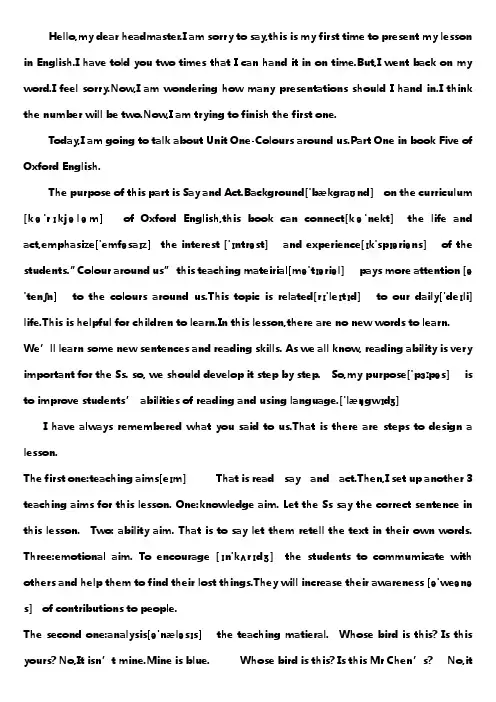
Hello,my dear headmaster.I am sorry to say,this is my first time to present my lesson in English.I have told you two times that I can hand it in on time.But,I went back on my word.I feel sorry.Now,I am wondering how many presentations should I hand in.I think the number will be two.Now,I am trying to finish the first one.Today,I am going to talk about Unit One-Colours around us.Part One in book Five of Oxford English.The purpose of this part is Say and Act.Background['bækɡraʊnd] on the curriculum [kə'rɪkjələm]of Oxford English,this book can connect[kə'nekt]the life and act,emphasize['emfəsaɪz]the interest['ɪntrəst]and experience[ɪk'spɪəriəns]of the students.”Colour around us”this teaching mateirial[mə'tɪəriəl]pays more attention[ə'tenʃn]to the colours around us.This topic is related[rɪ'leɪtɪd]to our daily['deɪli]life.This is helpful for children to learn.In this lesson,there are no new words to learn.We’ll learn some new sentences and reading skills. As we all know, reading ability is very important for the Ss. so, we should develop it step by step. So,my purpose['pɜːpəs]is to improve students’abilities of reading and using language.['læŋɡwɪdʒ]I have always remembered what you said to us.That is there are steps to design a lesson.The first one:teaching aims[eɪm]That is read say and act.Then,I set up another 3 teaching aims for this lesson. One:knowledge aim. Let the Ss say the correct sentence in this lesson. Two: ability aim. That is to say let them retell the text in their own words. Three:emotional aim. To encourage[ɪn'kʌrɪdʒ]the students to commumicate with others and help them to find their lost things.They will increase their awareness[ə'weənəs]of contributions to people.The second one:analysis[ə'næləsɪs]the teaching matieral. Whose bird is this? Is thisyours? No,It isn’t mine.Mine is blue. Whose bird is this? Is this Mr Chen’s? No,it isn’t his.His is yellow.According to this,I think the key point is the possessive[pə'zesɪv]case of a noun.Let my students keep them in mind.However, there are two difficult points: they are how to use their own words to retell the text.The third one:design a way.That is situational teaching.Someone’s thing is lost.He want some help.The fourth one:feedback.Let them retell the text in their own words.Ok,now let me enjoy my lesson.Before dealing[dil] with my lesson, I'll do my best to carry out the following theories: Make the Ss the real masters['mɑːstə(r)] in class while the teacher myself act as a coach.Step 1 Revision1. Free talk: We live in a colourful world. What colour do you know? What colour do you like?What colour can you see?What colour are the tresss?What colour are the flowers?With the question, the minds of the Ss have entered the new lesson.2. Review: different colours. Show the different colours and let the students revise the colours.Step 2 Presentation1.To train their listening ability .Use the chant. Let the students listen and chant.By the way,review: my, mine, your, yours, his,his, her,hers,our,ours,their and theirs.2.To train their listening ability .Use the tape.Let them listen to the tape and answer the question "Is the blue bird Mrs Chen’s?3.To improve the students reading ability .Let them read the passage['pæsɪdʒ] as quickly as they can.Then,they will fill in the blank.As soon as they all finish, let them look at the questions on the screen[skrin] and ask them to write down the correct answerswith a whole sentence.4.Teacher say the e my left hand and my right hand.My hand can talk with each other.5.Call a student say the diologue with me.6.Let all the students say the diologue with me.7.Group work.Every two students can make a group to say the diologue.Step three:retell a story.2.Let the students practise the dialogue using their school things.A: Whose book is this? Is it yours?B: Yes, it’s mine. /No, it’s not mine. Mine is thick.That’s all.Thank you! Then let me come to the second one.。
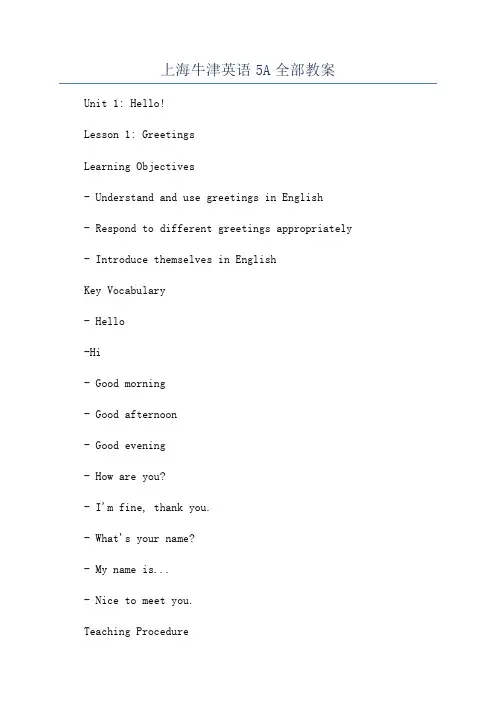
上海牛津英语5A全部教案Unit 1: Hello!Lesson 1: GreetingsLearning Objectives- Understand and use greetings in English- Respond to different greetings appropriately - Introduce themselves in EnglishKey Vocabulary- Hello-Hi- Good morning- Good afternoon- Good evening- How are you?- I'm fine, thank you.- What's your name?- My name is...- Nice to meet you.Teaching Procedure1. Warm-up (5 minutes)- Greet the students in English by saying "Good morning!" and asking "How are you?"- Encourage the students to respond with "Good morning!" and "I'm fine, thank you. How are you?"2. Presentation (10 minutes)- Introduce the new vocabulary by showing flashcards or pictures of greetings.- Model the pronunciation and ask the students to repeat after you.- Use gestures or actions to help convey the meanings of the words.- Practice saying different greetings with the students.3. Practice (15 minutes)- Divide the class into pairs or small groups.- Have the students take turns greeting each other and responding with appropriate expressions.- Walk around the classroom and provide assistance as needed.4. Production (15 minutes)- Have the students form a circle with their chairs.- Each student should introduce themselves by saying "Hello, my name is... Nice to meet you."- Encourage the students to ask each other "What's your name?" and respond with "My name is..." and "Nice to meet you."5. Consolidation (5 minutes)- Recap the new vocabulary and expressions learned in the lesson.- Have a class discussion about the importance of greetings in different cultures.6. Follow-up Activity (Optional)- Divide the class into two teams.- Play a game where each team takes turns greeting the other team in English.- Award points for correct greetings and responses.Unit 2: My DayLesson 1: Daily RoutineLearning Objectives- Understand and use vocabulary related to daily routines- Describe their own daily routines in English- Ask and answer questions about daily routinesKey Vocabulary- get up- have breakfast- go to school- have lunch- do homework- play games- have dinner- go to bedTeaching Procedure1. Warm-up (5 minutes)- Review the vocabulary from the previous lesson on greetings.- Play a quick game of Simon Says using the greetings and responses.- For example: Say "Simon says 'Good morning!'" and the students should respond with "Good morning!"2. Presentation (10 minutes)- Introduce the new vocabulary by showing pictures or flashcards of daily routines.- Model the pronunciation and ask the students to repeat after you.- Use gestures or actions to help convey the meanings of the words.- Practice saying different daily routines with the students.3. Practice (15 minutes)- Divide the class into pairs or small groups.- Have the students take turns asking and answering questions about their daily routines.- Encourage them to use the new vocabulary and expressions.4. Production (15 minutes)- Have the students work in pairs to create and performshort dialogues about their daily routines.- Each pair should write a simple dialogue using the new vocabulary and perform it in front of the class.- Provide feedback and encouragement to each group.5. Consolidation (5 minutes)- Recap the new vocabulary and expressions learned in the lesson.- Have a class discussion about the students' favorite parts of their daily routines.6. Follow-up Activity (Optional)- Have the students draw a picture or write a short paragraph describing their ideal daily routine.- They should use the new vocabulary and expressions learned in the lesson.。
![沪教版最新版本牛津英语5A教案[1]](https://uimg.taocdn.com/98bc9811e87101f69f31950a.webp)
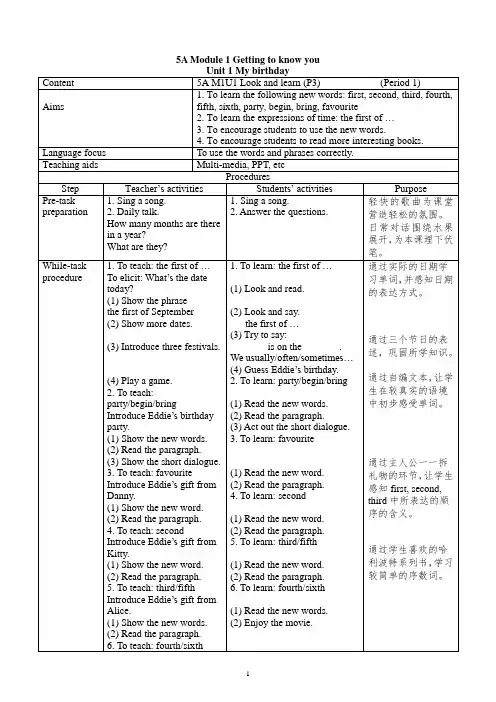
5A Module 1 Getting to know you5A Module 1 Getting to know you Unit 3 My future5A Module 2 Me,my family and friendsUnit 1 Grandparents5A Module 2 Me, my family and friendsTeam B scores three goals. Which teams wins/loses? (win/lose)3. To teach: <A football match.1) Show the questions.a. Are Danny and Peter in the school’s football club?b. What are the names of the two football teams?c. Are Peter and Danny in the same team?d. Who gives Danny some water at the half- time?e. Which team wins?f. What does Peter say to Danny?2) Watch the flash.3) To teach : P1a. Ask the questions (a.b.c)b. Read: memberGolden Boys Heroesc. Ask and answer:---What do you want to be?---I want to be a member ofGolden Boys. / Heroes.They always win!d. Read and act P1.4)To teach: P2a. Show the question (d)b. Listen to the radio about P2c. Say and act.P25)To teach: P3a. Show the questions.(e, f)b. Read: congratulations!c. Say and act P3 in two groups. 3.To learn:<A footballmatch>1) Listen and think.2) Watch the flash.3)To learn: P1a. Answer the questions.b. Read the new word andthe phrases.c. Work in pairs.d. Read and act: P14)To learn : P2a. Answer the question.b. Listen carefully.c. Say and act.P25)To learn: P3a. Answer the questions.b. Read the sentence.c. Say and act.出示问题,使学生带着问题观看,为下一步学习做好铺垫。
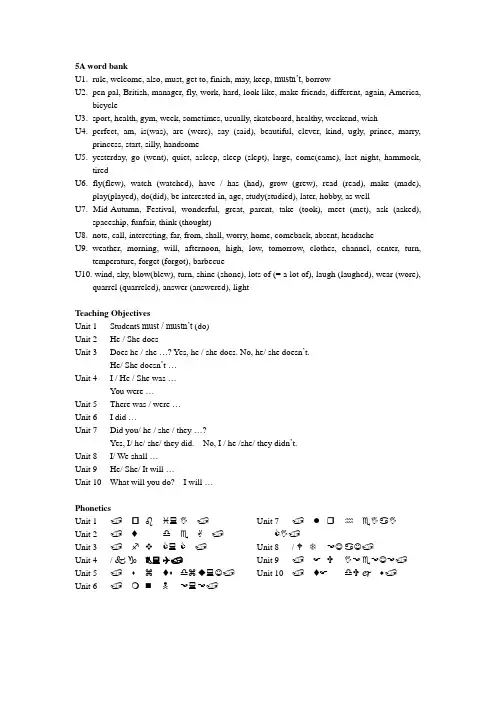
5A word bankU1. r ule, welcome, also, must, get to, finish, may, keep, mustn’t, borrowU2. p en pal, British, manager, fly, work, hard, look like, make friends, different, again, America, bicycleU3. s port, health, gym, week, sometimes, usually, skateboard, healthy, weekend, wishU4. p erfect, am, is(was), are (were), say (said), beautiful, clever, kind, ugly, prince, marry, princess, start, silly, handsomeU5. y esterday, go (went), quiet, asleep, sleep (slept), large, come(came), last night, hammock, tiredU6. fly(flew), watch (watched), have / has (had), grow (grew), read (read), make (made), play(played), do(did), be interested in, age, study(studied), later, hobby, as wellU7. Mid-Autumn, Festival, wonderful, great, parent, take (took), meet (met), ask (asked), spaceship, funfair, think (thought)U8. n ote, call, interesting, far, from, shall, worry, home, comeback, absent, headacheU9. w eather, morning, will, afternoon, high, low, tomorrow, clothes, channel, center, turn, temperature, forget (forgot), barbecueU10. wind, sky, blow(blew), turn, shine (shone), lots of (= a lot of), laugh (laughed), wear (wore), quarrel (quarreled), answer (answered), lightTeaching ObjectivesUnit 1 Student s must / mustn’t (do)Unit 2 He / She doesUnit 3 Does he / she …? Yes, he / she does. No, he/ she doesn’t.He/ She doesn’t …Unit 4 I / He / She was …You were …Unit 5 There was / were …Unit 6 I did …Unit 7 Did you/ he / she / they …?Yes, I/ he/ she/ they did. No, I / he /she/ they didn’t.Unit 8 I/ We shall …Unit 9 He/ She/ It will …Unit 10 What will you do? I will …PhoneticsUnit 1 ☐ ♌ ♓ ✋ Unit 2 ♦ ♎ ♏ ✌ Unit 3 ♐ Unit 4 / ♑ ✈Unit 5 ♦ ♦♦ ♎ ◆ ☺ Unit 6 ❍ ⏹ ☠ ☜ ☜ Unit 7 ● ❒ ♒ ♏✋ ♋✋✋Unit 8 / ❆ ☜☺ ♋☺Unit 9 ☞ ✞ ✋☜ ♏☜ ☺☜ Unit 10 ♦☞ ♎✞ ♦。
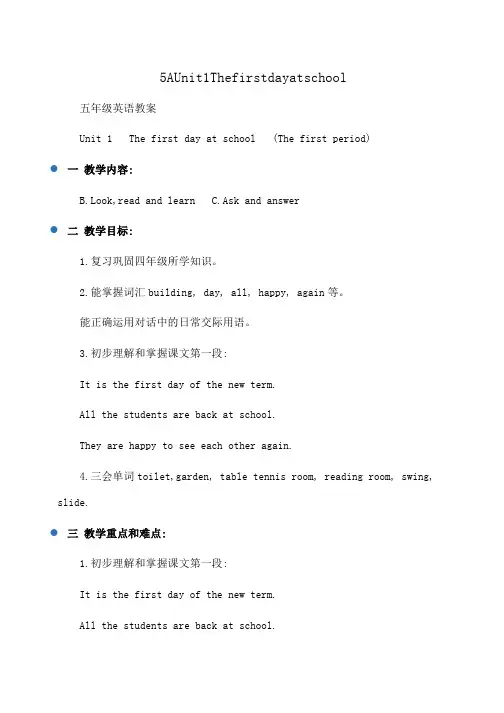
5AUnit1Thefirstdayatschool五年级英语教案Unit 1 The first day at school (The first period)●一教学内容:B.Look,read and learnC.Ask and answer●二教学目标:1.复习巩固四年级所学知识。
2.能掌握词汇building, day, all, happy, again等。
能正确运用对话中的日常交际用语。
3.初步理解和掌握课文第一段:It is the first day of the new term.All the students are back at school.They are happy to see each other again.4.三会单词toilet,garden, table tennis room, reading room, swing, slide.●三教学重点和难点:1.初步理解和掌握课文第一段:It is the first day of the new term.All the students are back at school.They are happy to see each other again.2.三会单词toilet,garden, table tennis room, reading room, swing, slide.●四课前准备: 录音机,磁带,课文挂图和歌曲“Two jackets”。
●五教学过程教学环节教师活动学生活动AWarm-upListen and sing a song “Two jackets”Listen to the song.B Free talk1. Say some sentences.2. Say to the students:。
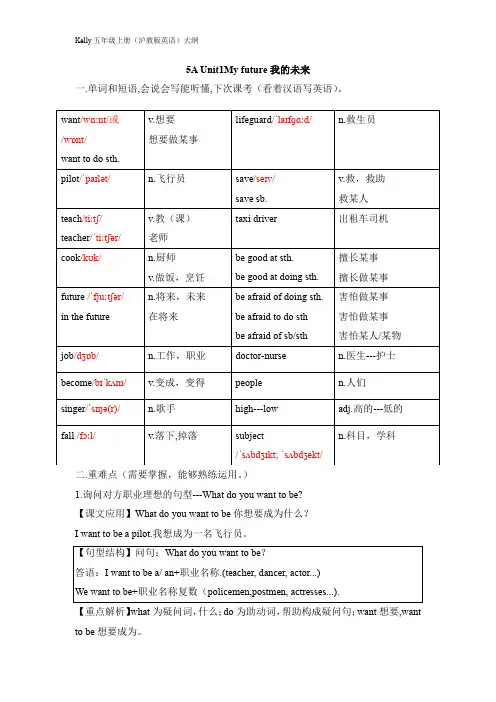
5A Unit1My future我的未来一.单词和短语,会说会写能听懂,下次课考(看着汉语写英语)。
二.重难点(需要掌握,能够熟练运用。
)1.询问对方职业理想的句型---What do you want to be?【课文应用】What do you want to be你想要成为什么?I want to be a pilot.我想成为一名飞行员。
【重点解析】what为疑问词,什么;do为助动词,帮助构成疑问句;want想要,want to be想要成为。
【生活实例】妈妈想知道Lucy的职业理想:Mum:What do you want to be,Lucy?你想成为什么,Lucy?Lucy:I want to be a teacher.我想成为一名老师。
2.want的用法【课文应用】I want to be a pilot.我想成为一名飞行。
职业名称集锦:actor演员,artist艺术家,writer作家,actress女演员,reporter 记者,driver司机,doctor医生,scientist科学家,teacher老师,cleaner清洁工,worker工人,policeman警察,policeman女警察,waiter服务员,singer歌手3.help的用法【课文应用】I want to help people.我想要帮助人们。
4.表示“擅长”的be good at:【课文应用】You are good at swimming.你擅长游泳。
be good at 同义短语是 例如:I am good at Chinese.=I do well in Chinese.我擅长语文。
She is good at playing the piano.她擅长弹钢琴。
My friend was good to me when I was ill.我生病的时候我的朋友对我很好。
Milk is good for you.牛奶对你有好处。
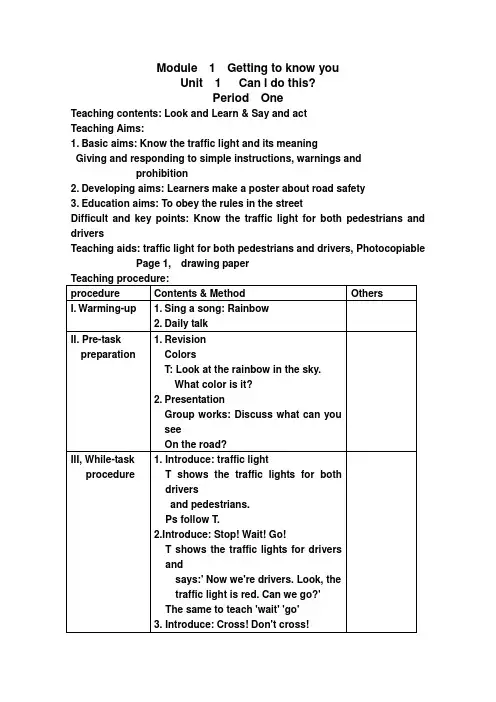
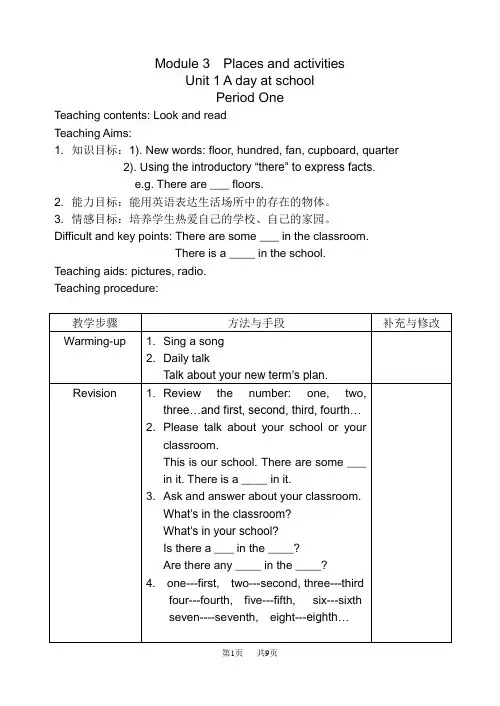
Module 3 Places and activitiesUnit 1 A day at schoolPeriod OneTeaching contents: Look and readTeaching Aims:1. 知识目标:1). New words: floor, hundred, fan, cupboard, quarter2). U sing the introductory “there” to express facts.e.g. There are ___ floors.2. 能力目标:能用英语表达生活场所中的存在的物体。
3. 情感目标:培养学生热爱自己的学校、自己的家园。
Difficult and key points: There are some ___ in the classroom.There is a ____ in the school.Teaching aids: pictures, radio.Teaching procedure:Module 3 Places and activitiesUnit 1 A day at schoolPeriod TwoTeaching contents: Find, count and writeTeaching Aims:1. 知识目标:Asking “How” questions to find out the quantitye.g. How many floors are there in your school?There are ____. \There is one.2. 能力目标:能用“How many”句型询问及回答。
3. 情感目标:通过询问更加深对学校的了解和热爱。
Difficult and key points: How many ____s are there in your school?There are ____. \There is one.Teaching aids: word cards, picture, radioTeaching procedure:Module 3 Places and activitiesUnit 1 A day at schoolPeriod ThreeTeaching contents: Look and sayTeaching Aims:1. 知识目标:1), New words: timetable, subject, English, Chinese, Maths,Science, Music, Physical Education, Art and Craft2). Using nouns to identity events.3). Using nouns to indicate time.2. 能力目标:能用英语表达自己所喜欢的科目。
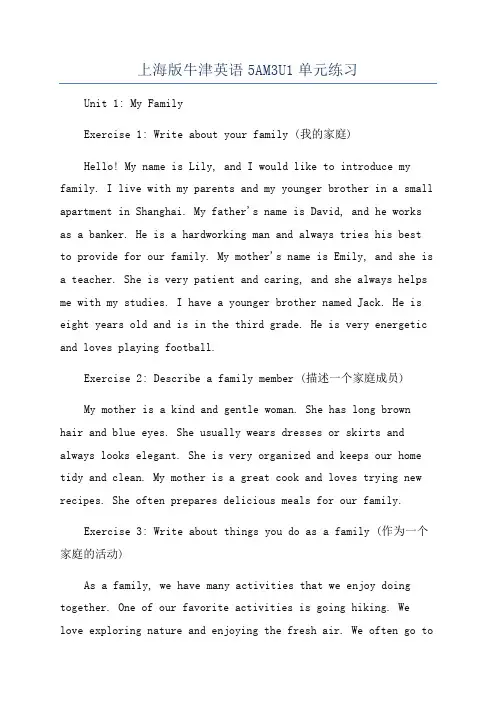
上海版牛津英语5AM3U1单元练习Unit 1: My FamilyExercise 1: Write about your family (我的家庭)Hello! My name is Lily, and I would like to introduce my family. I live with my parents and my younger brother in a small apartment in Shanghai. My father's name is David, and he works as a banker. He is a hardworking man and always tries his best to provide for our family. My mother's name is Emily, and she is a teacher. She is very patient and caring, and she always helps me with my studies. I have a younger brother named Jack. He is eight years old and is in the third grade. He is very energetic and loves playing football.Exercise 2: Describe a family member (描述一个家庭成员)My mother is a kind and gentle woman. She has long brown hair and blue eyes. She usually wears dresses or skirts and always looks elegant. She is very organized and keeps our home tidy and clean. My mother is a great cook and loves trying new recipes. She often prepares delicious meals for our family.Exercise 3: Write about things you do as a family (作为一个家庭的活动)As a family, we have many activities that we enjoy doing together. One of our favorite activities is going hiking. We love exploring nature and enjoying the fresh air. We often go tonearby mountains or parks on weekends and spend the whole day hiking. It's a great way for us to bond as a family and stay active.Exercise 4: Write about a family tradition (家庭传统)Exercise 5: Write about a memorable moment with your family (与家人的难忘时刻)Overall, my family is very important to me, and I am grateful for their love and support. We have created many wonderful memories together, and I look forward to many more family adventures in the future.。
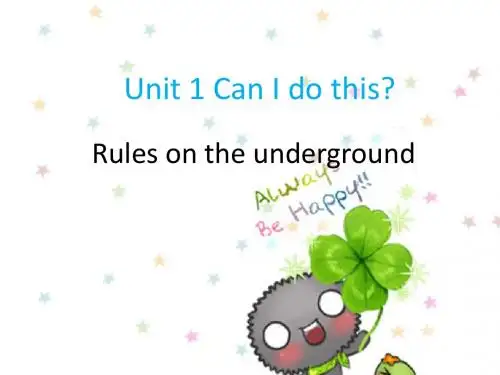
一、Unit 1新单词1. rule n. 规则,纪律school rules 校纪,校规class rules 班规Our class rules are written on the wall.2. finish v. 结束,完成e.g. You must finish your computer games before 7 o’clock.你必须在七点前结束你的电脑游戏。
翻译:When did you finish your homework?3.keep v. 保持,遵守e.g. Students must keep the school rules.学生必须遵守学校规定。
Keep quiet. 保持安静。
Students must keep books clean.4. also ad. 也,也是e.g. He is also an American.他也是个美国人。
5. maths n. 数学e.g.Which subject do you like best? Maths. 你最喜欢什么科目?数学6.welcome 感叹词欢迎常用搭配:Welcome to…欢迎来某地。
e.g. Welcome to Shanghai.7.borrow v. 借borrow强调的是“借入” e.g. May I borrow your umbrella? 我可以借一下你的伞吗?反义词:lend 借出 e.g. Will you lend your umbrella to me?能把你的伞借给我吗?8.get to 到达…e.g. Please get to the airport on time. 请准时到达机场。
二、Unit1重要知识点1.Welcome to our school. You must be Lily. “must be”表示“一定是,肯定是”,后常加形容词或人名。
如Your answer must be right. right为形容词,“对的正确的”。
5A Module 1 Unit 3Class________ Name_______ No._____ Mark_______平均分_____签名___ Part 1 Listening (听力部分)30% Ⅰ. Listen and choose (听一听,选出听到的内容,将字母代号写在前面的括号内)(听一听,选出听到的内容,将字母代号写在前面的括号内):5% ( ) 1. A. /w ɔ:k/ B . /'w ə:k ə/ C. /w ə:k/( ) 2. A. / 'f ɑ:mə / B. / 'f ɑ:ðə /C. / 'f ə:ðə / ( ) 3. A. / kuk / B. / k əuk/ C. /k ɔk/( ) 4. A. teacher B. teachers C. teach ( ) 5. A. pupil B. pupils C. super Ⅱ. Listen and choose (听一听,选出听到的句子,将字母代号写在前面的括号内)(听一听,选出听到的句子,将字母代号写在前面的括号内):4% ( ) 1.A. His father is a worker. B. His father is not a worker. C. His grandfather is a worker. ( ) 2.A. Everyone has a dream about his job. B. Everyone has a dream job. C. Everyone has a job in his dream. ( ) 3.A. The people who takes care about sick people is a nurse. B. The people who helps sick people is a nurse. C. The people who takes care about sick people is a doctor. ( ) 4. A. What do you want to be when you grow up? B. What does Kim want to be when he grows up? C. When you grow up, what do you want to be, children? Ⅲ. Listen and choose (听问句,选答句;听答句,选问句,将字母代号写在前面的括号内): 4% ( ) 1. A. Yes, I don’t B. Yes, I do. C. No, I don’t.( ) 2. A. Thank you. B. That’s OK. C. That’s all right.( ) 3. A. T o save people. B. To play with fire. C. T o show your strong body. ( ) 4. A. What job is teaching pupils? B. What job is cooking nice food? C. What job is growing vegetables? Ⅳ. Listen and number (根据听到的顺序,用“1“1---5---5---5””给下列句子编号):5% ( ) I’m Brett. My dad is a dentist. He looks after people’s teeth.( ) I’m Tim. When I grow up I’m going to be a pilot.( ) Tim and Brett are friends. They are talking about their dream jobs. ( ) A pilot flies planes. I love flying, and I want to learn how to fly planes. ( ) But I’m not going to be a dentist. I’m going to be a mechanic.Ⅴ. Listen and choose (听小对话和问题,选择最佳答案,将字母代号写在前面的括号内):4% ( ) 1. A. Their school. B. The weather . C. Shopping. ( ) 2. A. 8:15. B. 7:45. C. 7:15. ( ) 3. A. No, she doesn’t.B. No, only on Sunday . C. Y es, she does. ( ) 4. A. Class Two. B. Class Three. C. Class One. Ⅵ. Listen and write (听一听,填入所缺单词完成短文,每线一词)(听一听,填入所缺单词完成短文,每线一词):4% I’m Donna. I’m going to be a teacher when I ____________ up. I really like my teacher, ____________Miller. I want to be a teacher, too. I want to____________ children to read and write in the ____________. Ⅶ. Listen and judge (听短文,判断正误,用(听短文,判断正误,用T 或F 表示):4% ( ) 1. Eric wants to be a doctor, but his mother wants him to be a musician. ( ) 2. E ric doesn’t want to make his mother sad.Eric doesn’t want to make his mother sad.( ) 3. E ric fails in the doctor’s school.Eric fails in the doctor’s school.( ) 4. However, h e isn’t sad because he is now a famous musician.e isn’t sad because he is now a famous musician.Part 3 Reading and writing (笔试部分)70% Ⅰ. Copy the sentences (正确抄写下列句子,注意大小写和标点符号):6% i want to be a pilot I want to fly in the sky like the bird ______________________________________________________________________ Ⅱ. Look and write (根据图意完成句子,每线一词)(根据图意完成句子,每线一词):6% (1) (2) (3) (4) (5) (6) 1. Dan is a ________________, he helps the sick people. 2. Look! The little chick is calling ”Help!” It’s very _____________ now. 3. The frog ________ singing. B ut he is not good at singing. But he is not good at singing. 4. Do you want to ___________ around the world? That sounds interesting. 5. To be a ____________is very cool. He can fly in the sky like the birds. 6. --- W hat’s your dream job? What’s your dream job? --- To be a ___________. I can cook a lot of nice food. Ⅲ. Read and choose (语音判断,将不含有所给音标的单词的编号写在前面的括号内):4% ( ) 1. / /p/A. map B . pick B. pick C. spring ( ) 2. /k/ /k/ A. talk B. duck C. knife ( ) 3. /i:/ A. these B. sleep C. break ( ) 4. / / æ/ A . jam B. nap C. aeroplane Ⅳ. Choose the best answer (用waiter, taxi driver, gardener, nurse, artist, mechanic 填空,每词限用一次):6% 1. A/An________ looks after sick people. 2. A/An ________ brings food to people in a restaurant. 3. A/An ________ takes people where they want to go. 4. A/An ________ paints or draws pictures. 5. A/An ________ looks after plants in a garden. 6. A/An ________ can fix the broken things. Ⅴ. Read and fill in the blanks (用所给单词的适当形式填空,每线词数不限):6% 1. Kitty can ___________ (sing) Chinese songs. Listen, she ________________ (sing). 2. Let’s _________ (go) to the underground station. 3. My father __________________ (not watch) TV on Mondays. 4. Look, it __________________ (rain) now. Take an umbrella, please. 5. What do you want __________________ (be)? Ⅵ. Read and choose (选择最佳答案,将字母代号写在前面的括号内):10% ( ) 1.Mary can _________ the piano very well. A. play B. playing C. plays ( ) 2. Look, Tom is _________. Don’t _________ in the school. A. run…run B. running…running C. running…run( ) 3. There are three _________ in the street. A. buss B. buses C. bus ( ) 4. Look at the sign. It’s _________. A. circle B. round C. cold ( ) 5. --- _________ pen is under the desk? --- It’s T om’s.A. Who B. Whose C. Where ( ) 6. _________ read picture books in our class A. Don’t B. Not C. No ( ) 7.Alice is _________ to the station. She is ___________ for the bus. ing C. going…waitA. go… wait B. going…wait i ng ( ) 8.Do you like _________ football? A. play B. plays C. playing ( ) 9.This doll can sing. That doll can speak. _________doll do you like? A. Whose B. Which C. What ( ) 10. Can your mother _________ a bicycle? A . rides B. riding C. ride (读一读,填入适当的单词完成句子,首字母已给,每线一词):6% Ⅶ. Read and write(读一读,填入适当的单词完成句子,首字母已给,每线一词)1. I don’t know how to play this game. Can yout ___________ me? 2. When my parents go out, my aunt comes to l___________ after my little sister. 3. When I g_________ up, I want to be a doctor. 4. My watch is not working. Can you h____________ me? 5. Danny wants to teach c____________ how to read and write. 6. --- Which ones do you want? --- T____________ ones. Ⅷ. Rewrite the sentences(按要求改写下列句子,每线一词):10% 1. The big sign means “underground”.(划线部分提问)(划线部分提问)? _______ sign ________ “underground”“underground”? 2. Don’t smoke. (另写一句,意思不变)___________ __________. 3. It is time for dinner.(另写一句,意思不变)(另写一句,意思不变)It It’’s time __________ __________dinner. 4. Can we go out and play?(回答)_________, you_________. It’s raining. 5. They are waiting for their Mum.(划线部分提问)______are they _______for? Ⅸ. Reading comprehension(阅读理解):12%A. Read and judge(阅读短文,判断正误,用(阅读短文,判断正误,用T或F表示):4% T om is a new pupil. He is seven. This is the first day of the new term. T om is very happy. om, “Here’s a He is going to school today. Tom’s mother is very happy, too. She says to Tnew bag for you, T om.” And T om says, “Thank you, Mum.”( ) 1. Tom is a pupil. ( ) 2. School begins today. ( ) 3. T om isn’t happy.( ) 4. T om is at school now. B. Read and choose(阅读短文,选择最佳答案,将字母代号写在前面的括号内)(阅读短文,选择最佳答案,将字母代号写在前面的括号内):4% When you are in England, you must be very careful in the street because the traffic drives on the left. Before you cross a street, you must look at the right first then the left. If the traffic lights are red, the traffic must stop. Then the people on foot can cross the road! If the traffic lights are green, the traffic can go. The people on foot can’t cross. In the morning and in the evening when people go to or come from work, the streets are very busy. The traffic is the most dangerous. When you go by bus in England, you have to be careful, too. Always remember the traffic goes on the left. So you must be careful. Have a look first or you will go the wrong way. In many English cities, there are big buses with two floors(双层车). You can sit in the second floor. From there you see the city very well. It’s very interesting.( ) 1. If you go to England, you can drive on the ____________. A. right B. left C. both sides ( ) 2. In Shanghai, when you want to cross the road, first you look at the ________ side. A. right B. left C. both sides ( ) 3. When is the most dangerous for the traffic in a day? A. In the morning. B. In the afternoon. C. At night. ( ) 4. Are there any double-decker buses in Shanghai? A. Yes. B. No. C. I don’t know.C. Answer the questions about the story(阅读短文,回答下列问题,每线一词):8% There are about 5,000 fire fighters in Shanghai. Tim is one of them. He is on duty eight hours every day. During his shift, he eats and sleeps at the firehouse. The firefighters have to be ready to answer an alarm at any hour of the day or night. Most of the alarms are for small fires. They can be put out in a few minutes. Big fires are very dangerous. Most of the time, the greatest danger comes from smoke. Sometimes, fire fighters have to enter burning buildings in order to help the people inside. 1. --- How many fire fighters are there in Shanghai? --- __________ about _________. 2. --- What do the fire fighters have to do? --- They have to be ____________ to answer an ____________ at any hour of the day or night. --- They are for ________ ________. 3. --- What are most of the alarms for? --- It _________ from ___________. 4. --- Where does the greatest danger come from? Module 1 Unit 3 Part 1 Listening(听力部分)(听力部分)(听一听,选出听到的内容,将字母代号写在前面的括号内):Ⅰ. Listen and choose(听一听,选出听到的内容,将字母代号写在前面的括号内)1. worker 2. farmer 3. cock 4. Teachers give lessons to students. 5. Are you a pupil? (1. B 2. A 3. C 4. B 5. A ) (听一听,选出听到的句子,将字母代号写在前面的括号内):Ⅱ. Listen and choose(听一听,选出听到的句子,将字母代号写在前面的括号内)1.His father is a worker. 2.Everyone has a dream about his job. 3.The people who takes care about sick people is a doctor. 4. What does Kim want to be when he grows up? (1. A 2. A 3. B 4. B ) Ⅲ. Listen and choose(听问句,选答句;听答句,选问句,将字母代号写在前面的括号内):1. Do you want to have a good job? 2. Wow! You’re so brave!3. Why do you want to be a firefighter? 4. A farmer. (1. B 2. A 3. A 4. C ) “1—55”给下列句子编号):Ⅲ. Listen and number(听一听,用“1—Tim and Brett are friends. They are talking about their dream jobs. I’m Tim. When I grow up I’m going to be a pilot. A pilot flies planes. I love flying, and I want to learn how to fly planes. people’s teeth. But I’m not going to be a I’m Brett. My dad is a dentist. He looks afterdentist. I’m going to be a mechanic. A mechanic fixes cars. I like fixing things.(42135) (听小对话和问题,选择最佳答案,将字母代号写在前面的括号内):Ⅴ. Listen and choose(听小对话和问题,选择最佳答案,将字母代号写在前面的括号内)1. A: Is it hot here in summer? B: It’s not very hot here, and in the evening it’s cool. Some times it rains in the afternoon.. Q: What are they talking? 2. A: What time is it now? B: It’s a quarter to eight.A: It’s time for school. The first lesson begins at eight. B: Let’s hurry.s the time now? What’s the time now? Q: What’3. A: Do you like watching TV, Jane? B: Yes, I do, T om. But I only watch it on Sunday. Q: Does Jane watch TV every day? 4. A: Who are these boys and girls? B: They are Class Three students. A: What are they doing now? B: They are listening to the tapes. Q: Which class students are listening to the tapes? (1. B 2. B 3. B 4. B) (听一听,填入所缺的单词完成短文,每线一词):Ⅳ. Listen and fill in the blanksI’m Donna. I’m going to be a teacher when I grow up. I really like my teacher, Miss Miller. I want to be a teacher, too. I want to teach children to read and write in the future. (1. grow 2. Miss 3. teach 4. future) (听短文,判断正误,用T或F表示):Ⅴ. Listen and judge(听短文,判断正误,用Eric wants to be a musician, but his mother wants him to be a doctor. Eric doesn’t want to make his mother sad, so he is working hard to be a doctor. He learns medicine. But Eric However, he isn’t sad because he is now a famous musician.fails in the doctor’s school. H owever, he isn’t sad because he is now a famous musician.(1. F 2. T 3. T 4. T) Part 2 Reading and writing(笔试部分)(笔试部分)Ⅰ. I want to be a pilot. I want to fly in the sky like the bird. Ⅱ. 1. doctor 2. dangerous 3. is 4. travel 5. pilot 6. cook Ⅲ. 1. C 2. C 3. C 4. C Ⅳ. 1. nurse 2. waiter 3. taxi driver 4. artist 5. gardener 6. mechanic to, be Ⅴ. 1. sing, is singing 2. go 3. doesn’t watch 4. is raining 5.5. to, be Ⅵ.1. A 2. C 3. B 4. B 5. B 6. A 7. B 8. C 9. B 10. C Ⅶ. 1. tell 2. look 3. grow 4. help 5. children 6. These/ Those Ⅷ. 1. Which sign mean s “underground”?2. No smoking here. 3. It is time to have dinner. rry, I’m busy now.4. OK. / No problem. / So5. Who are they waiting for? Ⅸ. A. 1. T 2. T 3. F 4. T B. 1. B 2. B 3. A 4.A C. 1. There are about 5000. 2. ready, alarm 3. small fires 4. smoke Ⅹ. Omitted 。
5AM1U1 My birthday 单元设计()单元任务分析该单元的主题为My birthday,要求学生把握的核心辞汇是序数词:first、second、third、fourth、fifth、sixth等,让学生会用序数词正确表达日期,如:the fourth of October。
还可依照学生的具体情形拓展序数词的利用。
要紧句型是When’s … birthday?及回答It’s on the…of…。
要求学生能以我的生日为主题,进行时刻、内容、地址等的问答,邀请函的设计等。
除核心词之外,本单元还需要温习再现有关月份、礼拜、时刻等的表达。
另外,需要把握和操练的辞汇和词组包括bring some orange things to the party、 make a birthday invitation、make hats等,这些词组在日常交流中实际利用价值较大,可结合学生的实际情形进行教学,使学生能够做到运用这些辞汇进行流畅地交流。
音标教学方面,对[i:][I]进行发音的归类,让学生能看到音标想到字母或字母组合。
在情感表达方面,生日主题偏重通过邀请卡的书写,生日相关时刻、地址、主题的问答,生日聚会的开展营造生日前和生日中的愉快气氛。
本单元的故事教学是生日主题的延续,通过讲述父亲的辛苦工作及生日时收到父亲亲手制作的礼物的兴奋,旨在温习巩固新旧知识的同时,教育小孩知道感恩。
单元教学目标通过本单元的学习,学生能:1.把握序数词:first、second、third、fourth、fifth、sixth……把握单词:party、begin、bring、wear、favourite2.把握句型:When’s … birthday? It’s on the…of…The sounds interesting. I can’t wait.3.温习巩固月份、礼拜、衣饰的单词和词组及时刻表达法。
4.温习巩固can句型问答、时刻的问答及句型What do you have? I have……5.通过操练进一步把握一样此刻时态三单的表达方式。
一、Unit 1新单词1. rule n. 规则,纪律school rules 校纪,校规class rules 班规Our class rules are written on the wall.2. finish v. 结束,完成e.g. You must finish your computer games before 7 o’clock.你必须在七点前结束你的电脑游戏。
翻译:When did you finish your homework?3.keeep v. 保持,遵守e.g. Students must keep the school rules.学生必须遵守学校规定。
Keep quiet. 保持安静。
Students must keep books clean.4. also ad. 也,也是e.g. He is also an American.他也是个美国人。
5. maths n. 数学e.g.Which subject do you like best? Maths. 你最喜欢什么科目?数学6.welcome 感叹词欢迎常用搭配:Welcome to…欢迎来某地。
e.g. Welcome to Shanghai.7.borrow v. 借borrow强调的是“借入” e.g. May I borrow your umbrella? 我可以借一下你的伞吗?反义词:lend 借出 e.g. Will you lend your umbrella to me?能把你的伞借给我吗?8.get to 到达…e.g. Please get to the airport on time. 请准时到达机场。
二、Unit1重要知识点1.Welcome to our school. You must be Lily. “must be”表示“一定是,肯定是”,后常加形容词或人名。
如Your answer must be right. right为形容词,“对的正确的”。
“welcome to”欢迎,e.g:欢迎来中国。
2. Students must get to school on time. “get to school”到达学校,“go to school”去学校;must 是情态动词,must do sth;一般疑问句直接将must提前,否定句在must后面加not.on time 按时,准时翻译:小孩晚上必须按时回家。
Amy 每天步行去学校。
3. Students mustn’t run in the classroom. mustn’t 不准,禁止是must not的缩写e.g.You mustn’t speak loudly in public places.You mustn’t ride a bike in the street.翻译:不许将图书馆的书带出来。
4. so many“如此多”接可数名词复数e.g. We have so many musts and mustn’ts..So many books here.对比:so much 很多,如此接不可数名词e.g. There’s so much water in the lake. 湖里面有这么多的水。
There’s noise outside.I don’t want to play football with people.5.go out out ofWould you like to go out with me?你愿意和我一起出去吗?They walked out of supermarket.6. may, can , mustmay 可以(表示征求许可),可能(表示说话人不确定的态度)can 能够(表示能力)must 必须can和may都表示可以,区别在于may表示的态度更客气恭敬,can比较口语化,普通和不正式。
must必须,为命令强制的语气。
e.g. May I use your computer?我可以用一下你的电脑吗?You may be right.你可能是对的。
I can drive/make hats.我能开车/做帽子。
We must stop playing basketball.我们必须停止打篮球了。
选词填空I help you with your housework.I come in﹖We speak more English.You help each other.I go home now﹖I do the work myself.三、语音(结合教材)/ i: /e---- she mee---- these Chineseee---- sweet beeea---- sea read/ i /i---- it this drill fishy---- easy very happy early【沙场点兵】一、写出下列单词中划线部分音标bean bineat itseat sitthese thisleast listfifth fifteenthleave live二、判断下列划线部分的读音是否相同,用“T”或“F”表示( ) 1. these this ( ) 2. easy sit( ) 3. work walk ( ) 4. sweet sweater ( ) 5. bean sea ( ) 6. fifty fifteen ( ) 7. leave live ( ) 8. drill drive( ) 9. sheep ship ( ) 10. red read二、中译英1、第二天早上2、做帽子3、生日晚会4、第九个玩具5、四十二6、六月一日7、欢迎8、彼得的邀请函三、用所给单词的适当形式填空1、My birthday is on the ( three ) of July.2、How many ( sheep ) are there on the farm.3、There ( be ) some apple juice in the bottle.4、Where is your father? He (wash ) the dishes in the bathroom.5、Our little sister ( have ) a nice dress.四、选择最恰当的答案( )1. May I have water? —Yes, please.A. anyB. someC. a( )2. The students want a picnic in the park.A. havingB. hasC. to have( )3. Summer comes July, August and September.A. onB. atC. in( )4. Tommy a smart new hat on his bed.A. seesB. seeingC. see( )5. My English lesson begins one o’clock the morning.A. on; inB. in; atC. at; in五、按要求改写句子1. Have some sweets, please.(改为否定句)2. There are some orange things in the classroom. (改为一般疑问句)3. Her brother has a pair of trousers. (改为一般疑问句)4. Jill has some orange things. (对划线部分提问)5. Joe’s birthday is on the 5th of December. (对划线部分提问)【情态动词专练】(一) 用适当的情态动词填空。
1. Must I borrow the book with my ID card? No, you ________.2. ________ I use your car? Yes, you ________.3. ________ I go home now? No, you _________ stay here.4. My mother is ill. I _________ stay at home and look after her.5. ________ you like some tea?6. You ________ take more exercise.7. ________ you tell me how to get to the Qingyun Park?8. The clock ________ tell us the time.9. ________ you like to go fishing with me?10. ________ we play football this afternoon?(二) 按要求改写句子。
1. I can run fast.I ________ ________ fast. (否定句)2. You must return the book now.(一般疑问句)________ I the book now? No, you ________.3. He can play basketball well. (一般疑问句)_______ he ______ basketball well?4. They must take the books out of the room. (否定句)They ________ ________ the books out of the room.5. He should get up early. (否定句)He _______ get up late.(三) 单项选择。
()1. you like some milk ?A . Would B. Could C . Can()2. We pick the flower in the park.A. can’tB. don'tC. mustn’t( ) 3.W e should more trees, and we shouldn’t cut any trees.A. plantB. plantingC. plants( ) 4.What can I do for you?A. Yes, you can.B. No, I can do it.C. Yes, I’d like some oranges.( ) 5.Shall we visit the factory?A. Yes, we do.B. Yes, we shall.C. All right.( ) 6.Would you like something to eat?A. Yes, we would.B. Yes, I’d like some cakes.C. Yes, of course.。